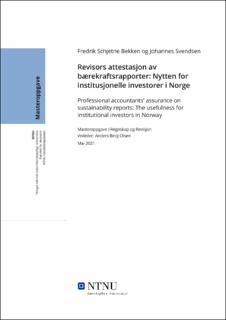| dc.contributor.advisor | Olsen, Anders Berg | |
| dc.contributor.author | Bekken, Fredrik Schjetne | |
| dc.contributor.author | Svendsen, Johannes | |
| dc.date.accessioned | 2021-09-22T16:05:58Z | |
| dc.date.available | 2021-09-22T16:05:58Z | |
| dc.date.issued | 2021 | |
| dc.identifier | no.ntnu:inspera:82733539:83968552 | |
| dc.identifier.uri | https://hdl.handle.net/11250/2780528 | |
| dc.description.abstract | Formålet med masteroppgaven er å forstå og forklare nytten av revisors attestasjon av bærekraftsrapporter for institusjonelle investorer i Norge. For å forstå hva som karakteriserer nytten av revisors attestasjon baserer studien seg på karakteristikkene for beslutningsnyttig informasjon i IASB (2018) sitt konseptuelle rammeverk. Prinsipal-agent-teorien og signalteorien er videre benyttet for å forklare hvorfor nytten av revisors attestasjon er slik.
Studien ble gjennomført som en casestudie og med et kvalitativt datagrunnlag basert på syv intervju foretatt med forskjellige, norske profilerte finans- og investeringsforetak av ulik størrelse. Intervjuene ble gjennomført med den hensikt å forstå hva investeringsforetakene karakteriserte som beslutningsnyttig bærekraftsinformasjon, og hvordan attestasjon utført av revisor kan være nyttig for at bærekraftsinformasjonen skal oppfylle disse karakteristikkene.
Vi finner at investeringsforetakene drar nytte av attestasjonens hovedformål ved at attestasjon bidrar til at informasjonen investorer benytter er, eller oppfattes som, pålitelig. Hvordan investeringsforetakene drar nytte av attestasjonens hovedformål viser seg imidlertid å være situasjonsavhengig, og varierer med investeringsforetakenes størrelse og tilgjengelige ressurser. Nytten av attestasjonens hovedformål viser seg å være todelt, enten som et signal på pålitelighet eller som et grunnlag for å gjøre egne vurderinger av informasjonens pålitelighet.
I tillegg til at investeringsforetakene drar nytte av attestasjonens hovedformål, finner vi at investeringsforetakene også drar nytte av attestasjonens tilleggsfordeler. Tilleggsfordelene er andre fordeler en attestasjon fører med seg som ikke er attestasjons hovedformål. Attestasjon anses å bidra til ytterligere relevant og sammenlignbar bærekraftsinformasjon, samt øke observerbar informasjonskvalitet i virksomhetens bærekraftsrapportering såfremt revisor er attesterende part. Videre tyder våre funn på at attestasjon signaliserer økt informasjonskvalitet dersom attestasjonen er utført av revisor fra et anerkjent revisjonsselskap. Enkelte av investeringsforetakene oppfatter i tillegg attestasjon som et signal på underliggende kvaliteter ved virksomheten. | |
| dc.description.abstract | The purpose of this master thesis is to understand and explain what the usefulness of professional accountants’ assurance on sustainability reports is for institutional investors in Norway. To understand what characterizes this usefulness for institutional investors the study has adopted the decision usefulness-characteristics in accordance with the IASB (2018) Conceptual Framework. Agency- and signaling theory have been used to explain why institutional investors see assurance provided by a professional accountant as useful.
The study was carried out as a case study in which we conducted seven interviews with investors from large and small renowned finance- and investment institutions in Norway. The aim of the interviews was to understand how the different interviewees characterizes decision-useful sustainability information and how sustainability assurance provided by a professional accountant can be useful to make sustainability information fulfill these characteristics.
We find that the main purpose of an assurance engagement is useful to investors because it increases the credibility of disclosed sustainability information. Assurance is either useful as signal that enhances credibility or as a basis for the investment institutions to individually assess the credibility of the information. Whether non-financial assurance is useful as a signal or as a basis for making own assessments is however dependent on the situation, but also dependent on the size and available resources of the investment institution.
Furthermore, we find that non-financial assurance has additional benefits that are useful to the investment institutions. Non-financial assurance additionally increases relevancy and comparability and increases the information quality in a sustainability report if the assurance provider is a professional accountant. Our findings also show that assurance is perceived as a signal of improved information quality if the assurance is provided by a renowned and large audit-firm. We also find that some, but not all, of the investment institutions perceive assurance as a signal of the underlying quality of the firm. | |
| dc.language | nob | |
| dc.publisher | NTNU | |
| dc.title | Revisors attestasjon av bærekraftsrapporter: Nytten for institusjonelle investorer i Norge | |
| dc.type | Master thesis | |
